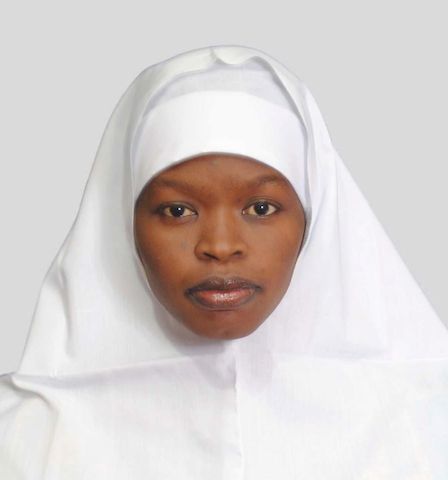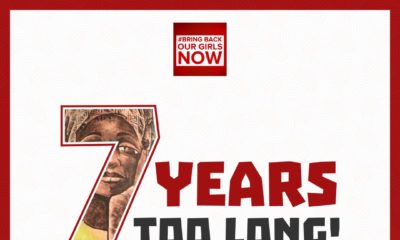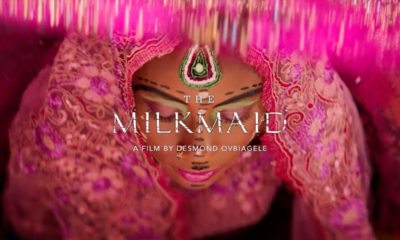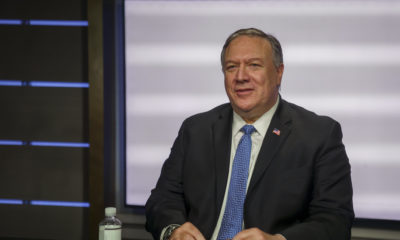News
Media Exposure Frustrated Release of Chibok Girls – Aisha Wakil (Mama Boko Haram)
In this revealing interview with PREMIUM TIMES’ Segun Ogundipe, Aisha Wakil, a lawyer with the National Human Rights Commission, who is regarded as “Mama Boko Haram” has said that the exposure the #BringBackOurGirls campaign got frustrated the release of the girls.
Wakil, who was recently released by the Army after being declared wanted, alongside two others, in connection with the Boko Haram menace, talked about her time at the Defence Headquarters and her role as a negotiator between the federal government and the terror group.
According to her, immediately of the kidnap, she pleaded for their release and the terrorists had agreed to release the girls, but later backtracked because “even Obama’s wife is carrying ‘#BringBackOurGirls'”.
She spoke of how her relationship with the Boko Haram members started and the one time she met Abubakar Shekau.
She also confirmed that the son of Mohammed Yusuf – the founder of the Boko Haram sect – known as Abu Musab al-Barnawi (who she called Habib) is in charge of the terror organisation.
Read excerpts below:
When you first heard that you were declared wanted, what ran through your mind?
First of all, what ran through my mind: I said ‘devil is at work’. Devil is a liar. I was a little bit taken aback. Because I left Maiduguri that very day but I didn’t hear anything of such. So when I heard it, I went through whatever their statement said. I read it all over and over and over again. I said, ‘well, that is it to do good things in Nigeria you have a price to pay’. You can just sacrifice your life and get a proper burial. When you carry Ghana-must-go, some people clap for you. But when you want to restore something good in Nigeria, you become a target.
So all these things flashed through my mind, and I now said I was weak but I said ‘God, into your hands I commit myself. Take control of me and don’t let this thing disturb the peace I’ve been building for the past seven years when this thing first started’.
What was your experience after you turned yourself in?
When we got there, we spent several hours at the Defence Headquarters. But I have never been there before. I just saw a big house and I walked in to say I want to see Buratai. So someone told me: ‘no, you go round there’.
I now went to the reception and I told the lady ‘I am Aisha Wakil, I am wanted’.
She asked me which newspaper and I said ‘you should know’. Then she asked me to write my name on a paper and I did and she went inside. Then one tall and fair man later came out to ask for my passport. Few minutes later, he came back with some military personnel. From there they put me inside a vehicle and they took me to the military command guest house. That was where I spent the night.
I wrote a lot of things for them. A lot of questions and what I know. They asked me to write everything I know about Boko Haram. After I wrote everything they became very impressed. Honestly. The room they gave me, I was treated like a queen.
For so many years you’ve been dealing with the Nigerian government, no one ever asked you these questions? They didn’t know you?
They didn’t ask me about my life. I was telling my story to them. It was Ahmed Bolori that introduced me to the Director of Military Intelligence, Abubakar Sa’ad, who later linked me up with now Chief of Army Staff, Buratai.
They were coming to my house to pick me for extensive meeting and after the meeting they would bring me back home. They were very impressed.
You said they treated you like a queen, but they still confiscated your phones and passport?
When I asked them for my phones, they said they won’t give me. They said that’s the process and my own was not going to be different.
Are you on administrative bail or you were just allowed to go?
Somebody bailed me out. Somebody signed my bail from SSS headquarters. I was transferred to the SSS on Tuesday, a day after I turned myself in.
What of the allegation that you were aiding Boko Haram? You could be charged under the anti-terrorism laws.
It is a misconception. Whoever did the announcement. I don’t think the Chief of Army Staff knew about it before the thing was aired out.
It’s been a long time you’ve been pursuing this road. How did the Nigerian authorities approach you or were you the one that reached out to them?
When I approached the government. I met first, Brigadier General Bello Sarkin-Yaki. The person that took me to Bello Sarkin-Yakin was Defence Minister, Bello Haliru. He was the one. When he came, I narrated the story to him and I told him these children they have listening ears. They are human beings like all of us. They can be handled.
You should stop bombing and killing, let them also stop what they were doing. He now said okay I should go to Bello Sarkin Yaki in the morning. So in the morning they took me there and I narrated the whole story. He was also very impressed. He now linked me up with Colonel Suleiman —I don’t know the surname. He was residing in Giwa Barracks. From then, I’ll be with Col. Suleiman and we’ll put the boys on the phone. Then the boys were so scared to go and meet any military man because they believed they were going to kill them. So when I call, I will connect them on the phone without them knowing I was with a military man. They would talk and talk. Then Suleiman would preach to them then they became shocked that a military man could quote Qur’an for them because Col. Suleiman was highly learned in Qur’an.
Sometimes they would come to my house and say they wanted to go and do something and I would preach to them not to do so.
What year was this?
2012.
Okay, the ones that informed you beforehand about attacks, what did they do after you preached to them?
They never returned to it. They swore not to kill again. But were later killed because they renounced Boko Haram.
You were involved in a series of negotiations with the Jonathan administration, apparently it all fell through?
When this thing initially started, they wanted it to finish immediately. But later, they said people were paying them to start killing people like politicians and businessmen and to destroy businesses. So they became divided later. So those that were used to bad activities they were using them freely and they then ran out of control.
But all the while I continued pleading, begging.
Did you ever meet Shekau while you were going to the bush?
No, I’ve never met Shekau before. But I knew him face to face. Before the war when I went to greet Mohammed Yusuf, he would block me and not allow me to go in because I had a police orderly then.
So when I returned home, Yusuf later came to my house and started pleading and begging. He used to be a simple, humble person. But I don’t know what happened and everything became like this.
One day I called Yusuf to my house and asked him if truly there was going to be a war, but he said no. Shekau and Abu Qaqa were on his entourage. Then Yusuf entered my sitting room.
Who do you think has control of the sect now? The original leader of the sect now?
Habib.
I’m sorry?
Barnawi, I know him as Habib. When he changed to this name, I sent him an SMS to tell him I won’t be calling him that name. ‘I know you as Habib son of Mohammed Yusuf.’
So, you believe he’s the one in charge?
Yes, he is.
What do you think is the prospect of rescuing the rest of the Chibok girls?
Assuming I had a clue that they were going to kidnap the girls, I would have been in Chibok sleeping. Then I would have been in that hall and everybody would be kidnapped. I didn’t know about it. When I heard about it, I told the government to calm down. They should keep quiet. I was able to pass the message across. I said ‘please start releasing them’. It did not take time before some of the girls were released. So by the time I knew it, the whole thing was in the media. Boko Haram now called me and said mama we are no more releasing. The Chibok girls have become diamond and gold. I asked why? They said even Obama’s wife is carrying ‘Bring Back Our Girls’. They now knew they were very important as attention was focused on them.
After that I became really disturbed. I started tracing them in the bush to see whether I could get to where the girls were. I slept in the bush. Then later they told me where to come and pick 50 of them. I was heading there with Dr. Steven Davis and one general. We slept in that bush. So by the time we got there, civilian JTF alerted them in the bush and was chasing them in the bush and they now took off. I went there with the ambulance. They called me in front of the general and requested that I should come to a certain location the following day and pick 50 girls. They said we should have 14 ambulance buses on standby. I said ‘okay’. They also told me to come with shai which means tea with milk and put plenty sugar. This is because some of the girls were very weak and one with a broken hand.
So Dr. Davies and that high-ranking general now decided to go with University of Maiduguri vans and some doctors and nurses. They warned me never to come with a military and if I do they would slaughter me in front of the military.
So we were making the preparation. The general with us received a message on his telephone: “Chibok girls sighted.” So we rushed. By the time we got there civilian JTF had seen them and gave them a hot chase.
By the time we got there they had driven them too far. I was calling on the telephone but their lines were switched off. It was later in the night I got them and they asked me: mama what happened? Did you tell anyone? I said ‘no I did not’. Civilian JTF chased them and there was a massacre.
They killed so many of them —up to 400— that time. We lost them, We slept in that bush with the military and commander of the military know me and everything. They were so happy that I could take this risk.
Early morning, they called me and asked ‘mama where are you?’ I said ‘I am somewhere’. They now said the roads were dangerous that we should pass through Monguno on our way back to Maiduguri. That was how we lost that one. If they had not chased them. If they had not sighted them we could have just finished this thing. Those 50 girls would have been in our custody. everything would have been over by now.
Okay, what would you say is the best approach now to rescue the girls? Do you think it is the military or diplomatic approach that is the solution? Would Boko Haram release the girls to you?
They will release everybody to me or you. If they find you worthy, they will release to you. They can release to anybody. What they wanted before was that they said they were going to send thirty commanders to me. If those thirty commanders can come meet the security, they would discuss and they need trust. If they trust them they go back to their bush and the next thing they will bring two girls.
Then, they will now make their demand during the meeting and bring some more girls.
Speaking further on how her relationship with the current members of Boko Haram group started, she said:
These boys, just as I said, some of them lived with me when they were young, when Borno was just perfect. They were in my house. They are from Sheguri North. My relationship with them started long ago. It started since I came to Maiduguri in 1989. So they grew up to see me. I am a very humble person. If I go to a place I relate a lot with the tradition.
I happened to win the hearts of all the elders, their wives, their children and when they were growing up they called me “yanjunmai” which means “loved mother.” So from this yanjunmai, they were with me. I keep them in my house. Some of them were going to school. Then when Mohammad Yusuf came to Borno, they started going there to learn Islam.
All of us were happy that our kids were no more idle. So Mohammed Yusuf was helping them, building them up. So Mohammed Yusuf won the heart of all the youth in Borno State and beyond Borno State. Because when somebody is giving you without collecting anything from you, you become part and parcel of that person and whatever he says you obey. So that was what happened,
I became their yanjuma. So when this thing came up, I did not stop and my family cannot tell me to stop.
Till today, in my house, if you go, you see a big pot that we use in cooking food for people. People that are not in my family, when the time comes, they come and eat. And that till today that is what we call nakowa. So, my family cannot stop me from doing it. And I am a very peaceful person. Right from my childhood I like to mediate between husband and wife when there is a crisis. It is inborn for me. They tried to stop me and I said ‘no’. If I don’t know them from day one, I won’t try it. I don’t speak the language. I don’t speak Hausa or Kanuri. But we understand ourselves.
Read the rest of the interview HERE.
Photo Credit: NAN PHOTO


























